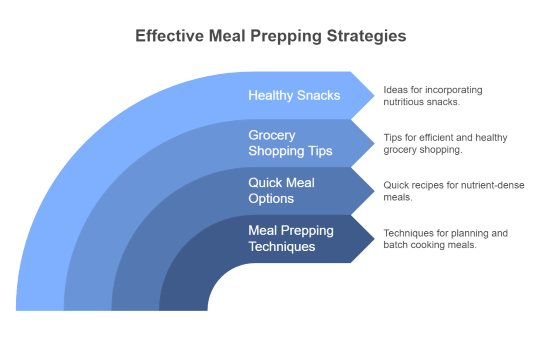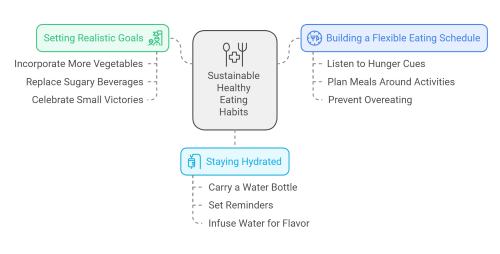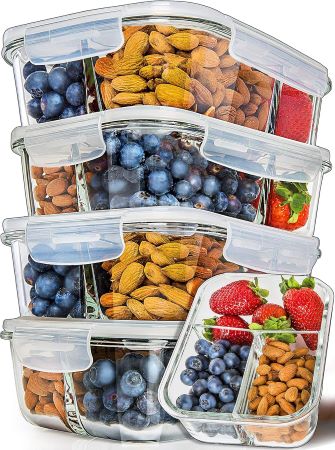1. Introduction
In today's fast-paced world, maintaining healthy eating habits can be challenging, especially for those with busy lifestyles. However, prioritizing nutrition is essential for overall well-being and can significantly impact energy levels, productivity, and long-term health. Healthy eating habits are not just about choosing the right foods; they involve creating a balanced diet that supports your body's needs while fitting seamlessly into your daily routine.
Many busy individuals face common challenges such as time constraints, lack of meal planning, and the temptation of convenient but unhealthy food options. These obstacles often lead to poor eating choices that can affect both physical and mental health. Developing healthy eating habits requires a conscious effort to overcome these hurdles by incorporating strategies that make nutritious choices more accessible and manageable.
By understanding the importance of healthy eating habits, busy individuals can start making small changes that lead to significant improvements in their lifestyle. This involves learning how to prepare quick, nutrient-dense meals and snacks that sustain energy throughout the day. Embracing healthy eating habits not only enhances personal well-being but also sets a positive example for others in similar situations. With the right approach, anyone can integrate healthy eating habits into their busy lives effectively.
Affiliate Disclaimer
This blog post may include links to affiliate sites. If you click on an affiliate link and make a purchase, we may earn a small commission or receive other compensation at no extra cost to you. Please note that many of the links on our site are affiliate links. Our use of these links does not impact the products, services, or websites we recommend to you. This disclaimer covers all forms of communication with you, including our website, email, phone, social media, products, and other platforms.
Amazon Affiliate Disclaimer
We participate in the Amazon Services LLC Associates Program, an affiliate marketing program that allows us to earn fees by linking to Amazon.com and its affiliated sites. If you click on an Amazon affiliate link on our site and make a purchase, we may receive a small commission at no additional cost to you.
2. Understanding the Basics of Healthy Eating Habits
What are healthy eating habits?
Healthy eating habits involve making conscious choices about the foods you consume to ensure a balanced intake of nutrients. This includes incorporating a variety of fruits, vegetables, whole grains, lean proteins, and healthy fats into your diet. By focusing on nutrient-dense foods, you can provide your body with the essential vitamins and minerals it needs to function optimally. Healthy eating habits also involve mindful eating practices, such as paying attention to hunger cues and avoiding overeating.
Benefits of maintaining healthy eating habits
Adopting healthy eating habits offers numerous benefits that extend beyond physical health. Physically, it can lead to improved energy levels, better weight management, and a reduced risk of chronic diseases such as diabetes, heart disease, and obesity. Mentally, a nutritious diet can enhance mood, cognitive function, and overall mental well-being. By consistently practicing healthy eating habits, you can improve your quality of life and longevity.
Debunking myths about healthy eating
There are many misconceptions surrounding healthy eating habits that can deter individuals from making positive dietary changes. One common myth is that healthy eating is expensive or time-consuming. In reality, with proper planning and smart shopping strategies, it is possible to eat healthily on a budget and within a limited time frame. Another myth is that healthy eating requires eliminating entire food groups or following restrictive diets. However, healthy eating habits emphasize balance and moderation rather than deprivation. It's important to recognize that occasional indulgences are part of a balanced diet and do not negate overall healthy eating habits.
3. Strategies for Adopting Healthy Eating Habits
Meal prepping for the week ahead
Meal prepping is a powerful strategy for maintaining healthy eating habits, especially for those with busy schedules. By dedicating a few hours each week to prepare meals in advance, you can ensure that you have nutritious options readily available. This reduces the temptation to opt for unhealthy convenience foods when time is limited. Start by planning a weekly menu, focusing on balanced meals that include proteins, carbohydrates, and vegetables. Utilize batch cooking techniques to prepare large quantities of food that can be stored in portioned containers for easy access throughout the week.

Choosing quick and nutrient-dense meal options
For those short on time, selecting quick yet nutrient-dense meal options is crucial to sustaining healthy eating habits. Incorporate simple recipes that require minimal preparation but are rich in essential nutrients. Examples include salads with lean protein, stir-fried vegetables with tofu or chicken, and whole grain wraps with a variety of fillings. Keep ingredients like pre-washed greens, canned beans, and frozen vegetables on hand to make meal preparation faster and more efficient.
Smart grocery shopping tips for busy people
Effective grocery shopping is key to supporting healthy eating habits. Create a shopping list based on your meal plan to avoid impulse purchases of unhealthy snacks. Focus on purchasing whole foods such as fresh produce, lean meats, and whole grains. Consider buying in bulk to save time and money. Additionally, explore online grocery shopping or delivery services to streamline the process further.
Incorporating healthy snacks into your routine
Snacking can be part of healthy eating habits if done mindfully. Choose snacks that provide sustained energy and nutrition, such as nuts, yogurt, fruit, or whole-grain crackers with hummus. Prepare snack portions in advance to prevent overeating and ensure you always have healthy options available when hunger strikes between meals.
4. Making Healthy Eating Habits Sustainable
Setting realistic goals and expectations
One of the most crucial aspects of maintaining healthy eating habits is setting achievable goals. Start by identifying specific, measurable objectives that align with your lifestyle. For instance, aim to incorporate one additional serving of vegetables into your daily meals or replace sugary beverages with water. By setting realistic expectations, you can gradually build healthier habits without feeling overwhelmed or deprived. Celebrate small victories along the way to stay motivated and committed to your long-term health goals.

Building a flexible eating schedule
Flexibility is key to sustaining healthy eating habits, especially for those with unpredictable schedules. Rather than adhering to rigid meal times, focus on listening to your body's hunger cues and eating when you're genuinely hungry. This approach helps prevent overeating and supports better digestion. Plan meals and snacks around your daily activities, ensuring you have nutritious options available regardless of your schedule. A flexible eating schedule allows you to adapt to changes while maintaining a balanced diet.
Staying hydrated throughout the day
Hydration is an often overlooked component of healthy eating habits. Drinking adequate water is essential for overall health, as it aids digestion, regulates body temperature, and supports cognitive function. Make it a habit to carry a reusable water bottle with you throughout the day and set reminders to drink water regularly. Infuse your water with fruits or herbs for added flavor if plain water becomes monotonous. Staying hydrated can also help control hunger and reduce the likelihood of mistaking thirst for hunger.
By focusing on these strategies, you can create a sustainable approach to healthy eating habits that fit seamlessly into your lifestyle. This ensures that nutritious choices become a natural part of your daily routine, leading to lasting health benefits and improved well-being.
5. Practical Tips for Eating Healthy on the Go
Packing portable, balanced meals
For busy individuals, preparing portable meals is a practical way to maintain healthy eating habits. Invest in quality containers that are easy to carry and keep food fresh. When packing meals, aim for a balance of macronutrients: include lean proteins like grilled chicken or chickpeas, complex carbohydrates such as quinoa or whole-grain bread, and plenty of vegetables. These balanced meals provide sustained energy and prevent the need for unhealthy fast-food options. Consider making wraps, salads, or grain bowls that are easy to eat on the move.

Healthy options at restaurants and takeout
Dining out doesn't have to derail your healthy eating habits. When choosing restaurants, look for those that offer fresh, whole-food ingredients and customizable menu options. Opt for dishes that are grilled, baked, or steamed rather than fried. Request dressings and sauces on the side to control portion sizes and reduce calorie intake. If you're unsure about the healthiest choices, don't hesitate to ask the staff for recommendations or modifications to suit your dietary preferences.
Keeping healthy snacks in your bag or desk
Having healthy snacks readily available is essential for maintaining healthy eating habits throughout a busy day. Stock your bag or desk with nutritious snacks such as mixed nuts, dried fruit, whole-grain crackers, or protein bars. These snacks can help curb hunger between meals and prevent impulsive choices that might not align with your dietary goals. Preparing snack portions in advance ensures you have a controlled amount ready whenever you feel hungry.
6. Leveraging Technology to Maintain Healthy Eating Habits
Meal planning apps for busy lifestyles
In the digital age, technology offers numerous tools to support healthy eating habits, particularly through meal-planning apps. These apps, such as Rex.fit Meal Planner and PlanMyPlate, provide personalized meal plans that cater to individual dietary needs and preferences.
By using these apps, you can save time and reduce the stress of deciding what to eat each day. They often include features like grocery list generation and nutritional tracking, making it easier to adhere to your healthy eating goals. With the convenience of having meal plans at your fingertips, maintaining healthy eating habits becomes more manageable amidst a hectic schedule.

Using reminders for hydration and meal timing
Staying hydrated and eating at regular intervals are vital components of healthy eating habits. However, busy lifestyles can make it easy to overlook these essentials. Technology can assist by providing reminder apps that prompt you to drink water and eat at scheduled times.
Apps like NutriPlan have integrated features for tracking water intake, ensuring you stay hydrated throughout the day. Setting reminders on your smartphone or wearable device helps keep hydration and meal timing top of mind, preventing dehydration and irregular eating patterns that could disrupt your healthy eating habits.
By integrating these technological solutions into your routine, you can effectively support and enhance your healthy eating habits. These tools provide structure and convenience, allowing you to focus on other aspects of your busy life while ensuring that nutrition remains a priority. Embracing technology not only simplifies meal planning and hydration but also fosters a more consistent approach to maintaining healthy eating habits in the long term.
7. Overcoming Obstacles to Healthy Eating
Dealing with time constraints
One of the most common barriers to maintaining healthy eating habits is a lack of time. Busy schedules often lead to skipped meals or reliance on fast food. To overcome this, prioritize meal planning and preparation. Set aside time each week to plan your meals and prepare ingredients in advance. Utilize slow cookers or instant pots to create healthy meals with minimal effort. By organizing your schedule around meal preparation, you can ensure that nutritious options are always available, even when time is limited.

Managing stress-induced cravings
Stress can significantly impact eating habits, often leading to cravings for unhealthy comfort foods. To manage these cravings, focus on incorporating stress-reducing activities into your daily routine, such as exercise, meditation, or deep-breathing exercises. When cravings arise, opt for healthier alternatives that satisfy without derailing your healthy eating habits, like dark chocolate or yogurt with fruit. Being mindful of emotional triggers and having strategies in place can help maintain control over your dietary choices, even during stressful times.
Staying consistent during travel or long hours
Travel and extended work hours can disrupt healthy eating habits due to limited access to nutritious foods and irregular meal times. To stay consistent, plan ahead by researching healthy dining options at your destination or packing portable meals and snacks. Choose accommodations with kitchen facilities when possible, allowing you to prepare your own meals. During long work hours, keep a stash of healthy snacks at your desk and set reminders to take breaks for meals. By preparing for these situations in advance, you can maintain your healthy eating habits regardless of your environment.
By addressing these common obstacles with practical strategies, you can uphold healthy eating habits even in challenging circumstances. This proactive approach ensures that nutrition remains a priority, supporting overall health and well-being despite life's demands.
8. Conclusion
Recap of strategies to fit healthy eating habits into a busy lifestyle
Throughout this guide, we've explored various strategies to integrate healthy eating habits into even the busiest of lifestyles. From meal prepping and choosing quick, nutrient-dense options to leveraging technology and overcoming common obstacles, these approaches provide a comprehensive framework for maintaining nutrition amidst life's demands. By understanding the basics of healthy eating habits and employing practical tips for on-the-go nutrition, you can make positive dietary choices that support your overall well-being.
Encouragement to start small and stay consistent
Adopting healthy eating habits doesn't require drastic changes overnight. Instead, focus on making small, manageable adjustments that gradually build into lasting habits. Consistency is key; even minor improvements can lead to significant health benefits over time. Celebrate your progress and remain patient with yourself as you navigate this journey.
Call to action: Commit to one new healthy habit this week
To begin implementing these strategies, commit to adopting one new healthy habit this week. Whether it's drinking more water, incorporating more vegetables into your meals, or planning your lunches for the week, taking this first step can set the foundation for a healthier lifestyle. Embrace the challenge and experience the positive impact of healthy eating habits on your life.
FAQs
- Can I maintain healthy eating habits while dining out or ordering takeout?
- Absolutely. Many restaurants offer healthier options such as salads, grilled meats, and whole-grain products. Opt for dishes that are grilled, baked, or steamed, and ask for dressings or sauces on the side to control calorie intake.
- How can I incorporate more vegetables into my diet?
- Aim for at least five servings of vegetables per day. You can add them to meals by including a variety of colors and types in salads, soups, or stews. Try to fill half your plate with vegetables to ensure a diverse intake of nutrients.
- What are some quick and healthy snack options for busy people?
- Keep snacks like mixed nuts, fruit yogurt, whole-grain crackers with hummus, or fresh fruit on hand. These options are nutrient-dense and provide sustained energy throughout the day.
- Is it necessary to eat breakfast every day?
- Eating breakfast can help regulate hunger and improve cognitive performance throughout the day. It provides an opportunity to consume nutrient-dense foods that fuel your body and mind.
- How do I manage cravings when stressed?
- Incorporate stress-reducing activities like exercise or meditation into your routine. Choose healthier alternatives like dark chocolate or yogurt with fruit to satisfy cravings without compromising healthy eating habits.
- Can technology help me maintain healthy eating habits?
- Yes, meal planning apps and reminder tools can assist in organizing meals and ensuring hydration. These technologies make it easier to stick to a nutritious diet amidst a busy lifestyle.
- What is the benefit of eating small meals every 2-3 hours?
- Eating small, balanced meals every few hours helps maintain metabolism, stabilize blood sugar levels, and prevent overeating by keeping hunger at bay.


